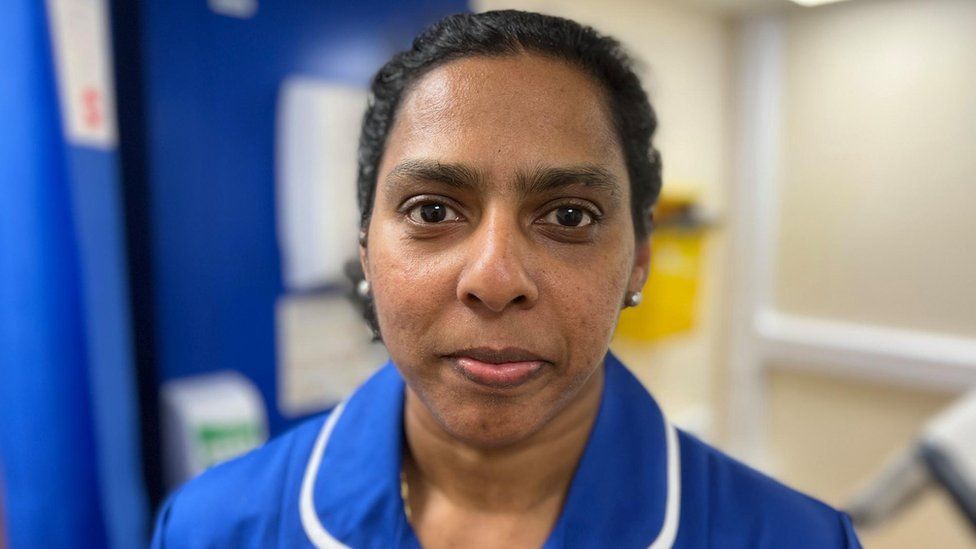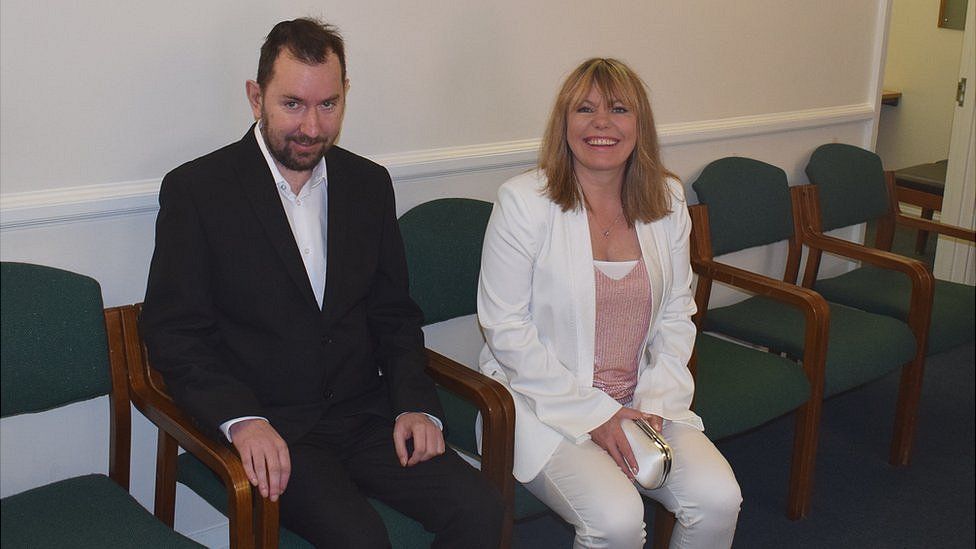Parkinson's Disease: 'You can have a career after diagnosis'
Published23 minutes agoShareclose panelShare pageCopy linkAbout sharingImage source, Nikki Fox/BBCBy Nikki FoxBBC East health correspondentTincy Jose is a junior sister working in urgent care at the Queen Elizabeth Hospital in King’s Lynn, Norfolk. When the 45-year-old reported symptoms to her GP, she said a diagnosis of Parkinson’s Disease completely overwhelmed her. But she has managed to turn her journey into “a calling” – to support and encourage others with the condition. This is her story.Something under my shoe?Image source, Kevin Saddington/BBC”It was a night shift and the corridors in the hospital were really quiet. I was walking along, and noticed that my right footstep noise was louder than my left. Initially I thought there was something stuck under my shoe, so I lifted it to check, but there wasn’t. I didn’t go to the doctor straight away as I didn’t want him to think I was silly. Being a nurse, working and taking care of the family, you don’t always consider your own health. After my colleagues noticed my symptoms, I went to my GP and he referred me to a neurologist.While waiting for a diagnosis, I noticed some stiffness in my shoulder, then I went to Mass and the prayer card I was holding in my right hand was shaking.I started to think something was really wrong, but I didn’t want to think too much about it. Image source, Tricia Yourkevich/BBCWhile reading the BBC website, I came across an article on Dr Paul Sinha, from the TV programme, The Chase. He had been diagnosed with Parkinson’s. There was a link to his blog which explained his symptoms. He talked about stiffness in his shoulder and limping. I thought, am I going that way? I read it again and again.When you hear the words ‘Parkinson’s Disease’ you know it’s an incurable and progressive condition. It was overwhelming me.’My mind went blank’Image source, Nikki Fox/BBCI was at work when I received the diagnosis over the phone. The first thing that came into my mind was being a mum of young children. My mind and brain went blank. Even though I was expecting it, I felt like I was in a different world.The neurologist told me to take time to accept it and said he had prescribed me medication. He booked an appointment for six weeks’ time. I put the phone down, turned around and my colleague said: ‘Are you ok?’ – I couldn’t talk. Then, from nowhere my matron stood in front of me. I thought God had sent her. She took me into her office and gave me a chair. I just burst out in tears. She gave me time and space to calm down. She said: ‘Remember there is a treatment. You can still progress in your career, you can see your children growing up, you can spend time with them.’ She told me to prepare my mind and that nothing was going to stop me.’Out of hibernation’Image source, Queen Elizabeth HospitalIt took me nearly one and a half years to disclose the diagnosis to all of my colleagues. But I gradually realised there was a purpose to it. I believe it was ‘a calling’.Normally I’m calm and quiet, but I wanted to raise awareness and started to come out of my hibernation because of that.I’m a member of an informal group of NHS professionals diagnosed with the disease. There are 40 members across the UK, Ireland and Australia. We are trying to raise awareness about the importance of timely medication for those with Parkinson’s in hospital. The medications control the symptoms and if there is a delay in giving it, the symptoms will reappear. If this delay is more than 30 minutes, it can affect the patients’ ability to walk and talk – and a person’s discharge home. According to Parkinson’s UK, 58% of patients admitted to hospital, didn’t get their medication on time, every time.The charity also gave me the opportunity to meet the minister for disabled people, Tom Pursglove. I explained how I am living with Parkinson’s and the medication campaign. I also spoke to him about the importance of adding Parkinson’s to the prescription exemption list and how we feel more specialists need to be recruited.[A spokesperson for NHS England said: “While local NHS trusts are each responsible for their own medicines policy, NHS England has commissioned a range of support, information and resources for organisations on this issue, which have been used by hundreds of health professionals – we will continue to encourage their use so patients in hospital can get their medication in a timely way.”]’There is life after diagnosis’Image source, Queen Elizabeth HospitalParkinson’s has more than 40 symptoms. Not everyone feels the same, but it does affect movement. If you are getting towards the end of a busy day, you may feel incredibly tired. You get stressed easily and my writing has slowed down, but working with a supportive team helps.I want to show others that there is life after diagnosis. I have had the opportunity to develop my career, progressing from a band five nurse to a band six junior sister. You have to be active and confident you can continue your work.Recently I was awarded the ‘Best Nurse of the Year’ from MalayalamUK. Malayalam is a language spoken in Kerala in India, where I lived before relocating to the UK in 2008.Tincy’s mantraI believe to live well with Parkinson’s, you have to be a ‘PARKINSON’:Positivity helps you to go forwardActive nature improves your movementResilience helps to face your challengesKind to yourself Insightful thinking is power to be purposefulNurturing skills will help to support othersSelf confidence is mandatory Optimism will help you achieve dreamsNoble attitude leads you to positive outcome’Super mum’If you are struggling, you need to get support. Your mind is your weapon.The former president of India, Dr APJ Abdul Kalam said: ‘Life is very similar to a boxing ring. The defeat is not declared when you fall down, but it is declared when you fail to rise up.’ The same way that when you receive a long term diagnosis, it is not the end of your career or your life. It is not the end of your world. There will be more opportunities, but if you’re not looking for the door or knocking on it, you won’t find the opportunities.On the first Mother’s Day after my diagnosis, my son wrote ‘super mum’ on my card. I asked him: “Why did you write that?”. He said: “You are a super mum because you have Parkinson’s, you’re still working and looking after us.” That made me cry. I’m so grateful for them supporting and helping me.I will continue my work until I can.”Find BBC News: East of England on Facebook, Instagram and Twitter. If you have a story suggestion email eastofenglandnews@bbc.co.ukMore on this storyParkinson’s implant restores man’s walkPublished6 November’My NHS hell waiting for surgery and information’Published29 OctoberGut problems may be early warning of Parkinson’sPublished25 AugustParkinson’s disease device trialled at hospitalPublished11 AprilRelated Internet LinksThe Queen Elizabeth Hospital King’s LynnParkinson’s disease – NHSThe BBC is not responsible for the content of external sites.
Read more →

